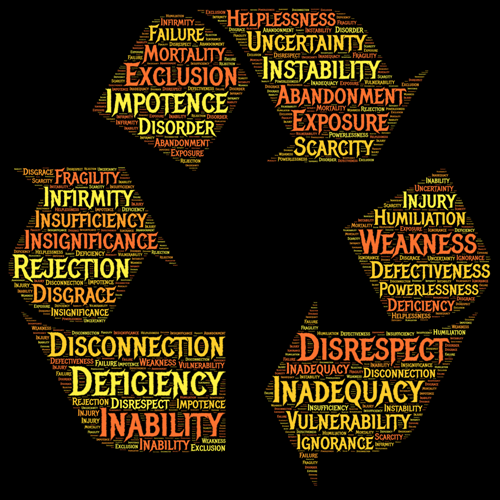 Learning about your mental health is hard work. From a spectrum of illnesses to normal thought patterns being negative, the concept of “taking every thought captive” can seem impossible. Since much of what happens in your brain is subconscious, it takes effort to change patterns and habits of negative thinking into healthy thinking.
Learning about your mental health is hard work. From a spectrum of illnesses to normal thought patterns being negative, the concept of “taking every thought captive” can seem impossible. Since much of what happens in your brain is subconscious, it takes effort to change patterns and habits of negative thinking into healthy thinking.
Negative thought patterns can affect your mood, your attitude toward work, and your relationships. Your brain creates ruts and in times of stress will default into the most familiar ruts. It takes time to program or reprogram the ruts to healthy thinking, rather than negative thinking.
Then the Spirit of the Lord came on me, and he told me to say: ‘This is what the Lord says: That is what you are saying, you leaders in Israel, but I know what is going through your mind.’ – Ezekiel 11:5, NIV
We can learn to break our negative thought patterns when we ask God for help. He will show us what is going through our minds and help us reprogram our thoughts with the truth in his Word.
Here are five ways to change negative thought patterns to healthy thought patterns.
- From shame to faith
- From anger to grace
- From worry to hope
- From depression to patience
- From distraction to intention
Shame to Faith
“Do you really think anyone can hide himself where I cannot see him?” the Lord asks. “Do you not know that I am everywhere?” the Lord asks. – Jeremiah 23:24, NET
If you experience thoughts of shame, your negative thinking is toward yourself. You may think that you are “bad” in some way. It may be that you believe cruel and unkind things that others have told you. Or you could be constantly thinking of how to be “better.”
 Shame and pride are thoughts that go together, thinking that you deserved something, or that you are better than others. The double-sided coin of shame and pride is a focus on your self-worth, determined by yourself.
Shame and pride are thoughts that go together, thinking that you deserved something, or that you are better than others. The double-sided coin of shame and pride is a focus on your self-worth, determined by yourself.
Romans 12:3 NIV states, “Do not think of yourself more highly than you ought, but rather think of yourself with sober judgment, in accordance with the faith God has distributed to each of you.” This is a good measuring stick for our thoughts.
Break the negative thought patterns of shame and pride by focusing on your faith in the work that God is doing in your life. Learn to look away from what you say about yourself to what God says – you are his beloved child.
Anger to Grace
Brothers and sisters, stop thinking like children. In regard to evil be infants, but in your thinking be adults. – 1 Corinthians 14:20, NIV
A cycle of angry thoughts is a negative thought pattern towards others. Angry thoughts can lead to all kinds of unpleasant actions. Thought patterns of anger towards others or towards a situation may eventually cause you to lash out in harmful behaviors. If you are thinking about how much you hate something, most likely you will not express your frustrations with patience or kindness.
Philippians 4:8 NIV tells us, “Finally, brothers and sisters, whatever is true, whatever is noble, whatever is right, whatever is pure, whatever is lovely, whatever is admirable—if anything is excellent or praiseworthy—think about such things.” When we focus on these things, our anger can dissipate, and we can choose to show grace.
You can control an errant temper by recognizing when angry thought patterns are crossing your mind. From there. learn what triggered it. When you can identify your trigger, you can learn to show grace to others and accept grace from God.
Worry to Hope
Now a word was brought to me stealthily; my ear received the whisper of it. Amid thoughts from visions of the night, when deep sleep falls on men, dread came upon me, and trembling, which made all my bones shake. – Job 4:12-14, ESV
 Anxiety and worry are negative thought patterns about your circumstances. If you spend a lot of time worrying about the troubles of the world, or even the ones in your life, there is a good chance your sleep is interrupted.
Anxiety and worry are negative thought patterns about your circumstances. If you spend a lot of time worrying about the troubles of the world, or even the ones in your life, there is a good chance your sleep is interrupted.
You may have financial concerns, health concerns, or big decisions weighing on your mind. Perhaps there is conflict in your community causing you anxiety. Or maybe you are a parent, deeply worried about all things related to your children.
Colossians 3:2-3 NASB says, “Set your minds on the things that are above, not on the things that are on earth. For you have died, and your life is hidden with Christ in God.” With God’s help, you can choose to surrender your worries to God and choose to hope in him instead.
Finding hope amid worry will help keep the negative thought patterns of worrying from interfering with your life. Focus on the promises of God, the good gifts he has given, and the reasons you have hope for the future rather than fear. Remember that God has all things in his control and will care for your needs.
Depression to Patience
My soul continually remembers it and is bowed down within me. – Lamentations 3:20, ESV
When you deal with depression your thoughts tend to get stuck in a loop. Breaking out of the negative thought loop is incredibly difficult. It requires that you prepare ahead of time with healthy thought prompts. Talking to a trusted friend or therapist can help you break the cycle that you experience when you are dealing with depression.
James 5:7 ESV tells us, “Be patient, therefore, brothers, until the coming of the Lord. See how the farmer waits for the precious fruit of the earth, being patient about it, until it receives the early and the late rains.” Patience in the Lord will help you trust that God can bring you out of your depression and give you hope and joy instead.
When you are patient with yourself, when you have friends to help, you will be able to receive joy on the other side of depression. Be patient with yourself as you learn to break the negative thought patterns of depression.
Distraction to Intention
And Solomon, my son, learn to know the God of your ancestors intimately. Worship and serve him with your whole heart and a willing mind. For the Lord sees every heart and knows every plan and thought. If you seek him, you will find him. But if you forsake him, he will reject you forever. – 1 Chronicles 28:9, NLT
Distraction is an avoidant negative thought pattern. You likely own a television, computer, and smartphone, and they help you avoid confronting unpleasant thoughts with games and social media.
help you avoid confronting unpleasant thoughts with games and social media.
These can be helpful tools, but they may also be providing your brain with distractions that you struggle to focus on what needs your attention. When you feel shame, anger, loneliness, worry, or sadness, you may want to distract yourself from these emotions. But this does not help you have healthy thought patterns.
Psalm 119:105 NIV states, “Your word is a lamp for my feet, a light on my path.” God knows every plan and thought in our minds, and he wants us to stay focused on what’s right. He will illuminate the right path for us to follow and keep us from being distracted from the plans he has laid out for us.
Intentionally seeking God will take effort on your part. You need to set boundaries for the things that you know distract you. Find the things that help draw attention to the goodness of God, rather than what distracts you.
Christian Counseling for Negative Thoughts
Years of negative thought patterns will not go away in a few short weeks. Those patterns can be changed when you are willing to practice new patterns. They can also be broken when you enlist the help of a Christian counselor.
When you are trying to break negative thought patterns, commit to a regular prayer life and reading of Scripture. Filling up your mind with God’s word will help with breaking negative thoughts. Seek trustworthy friends and mentors who will help and encourage you in this process. Also, consider reaching out to a trained counselor who will help you break free from negative thoughts.
“Disequilibrium”, Courtesy of Taylor Deas-Melesh, Unsplash.com, CC0 License; “Criticism Cycle”, Courtesy of John Hain, Pixabay.com, CC0 License; “Fervent Prayer”, Courtesy of Fa Barboza, Unsplash.com, CC0 License; “Open Bible”, Courtesy of Aaron Burden, Unsplash.com, CC0 License

